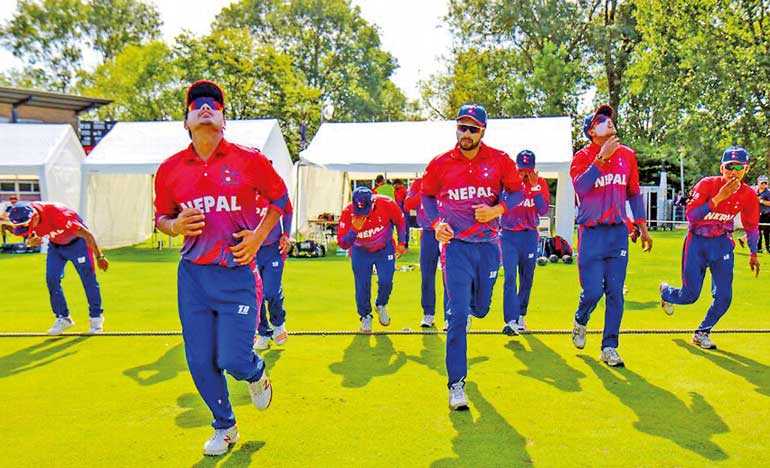Sunday Feb 22, 2026
Sunday Feb 22, 2026
Wednesday, 29 January 2020 00:13 - - {{hitsCtrl.values.hits}}

Nepal run onto the field for the start of play in their maiden ODI
ESPNCricinfo: The ICC has eased concerns over proposed plans to scrap the men’s T20 World Cup Qualifier for the 2021 edition of the men’s T20 World Cup, announcing that it will remain in a revised format.
After receiving push-back from some leading Associate members over threats to scrap the qualifier altogether, the global qualifier field has been expanded from 14 to 16 teams but will be split into two eight-team qualifying tournaments.
Under the format of the 14-team qualifier that concluded last October in the UAE, the top six out of 14 teams advanced to the T20 World Cup in Australia for October 2020. But for 2021, only four qualification spots will be up for grabs. Two each will go to the top pair of teams from each of the redesigned eight-team global qualifiers. A decision had already been taken that all teams advancing to the Super 12 stage for the 2020 T20 World Cup would automatically be part of the 2021 T20 World Cup, meaning a reduction in the number of qualifying berths remaining via the qualifier pathway.
The initial proposal that was reportedly under discussion in October was for the last four berths to be decided by four regional qualification finals.
However, that could have presented a possible scenario in which only one of Ireland, Scotland and Netherlands may have been able to advance to the 2021 T20 World Cup in the event that none of the three European countries advanced from the opening round into the Super 12 of this year’s T20 World Cup.
Similarly, it could have presented a scenario where only one of Bangladesh or Sri Lanka could have advanced from a 2021 Asia regional qualifier if neither country progresses to this year’s Super 12. It also meant two of the ICC’s five Associate regions would have to play a joint regional final to account for the difference between five regions and four berths.
To avoid such a scenario, the global qualifier has remained open. The ICC will still use lead-in regional events – as has been done since 2011 – to decide some berths for teams participating in the dual 2021 global qualifiers. Two teams each from Asia, Europe and the Americas will join the regional champion from East Asia-Pacific and Africa in advancing to the global qualifier to take up eight of the 16 slots. The four teams who fail to advance to the Super 12 stage in Australia will also fall into the 2021 global qualifier.
Meanwhile, the ICC stated that the remaining four slots in the global qualifier have been decided based on rankings. Zimbabwe, Nepal, UAE and Hong Kong are the beneficiaries of the four ranking-based slots. Both UAE and Hong Kong fell just short of advancing to the 2020 T20 World Cup in Australia after losing playoff matches to Scotland and Oman respectively in Dubai.
The expansion of total teams in the global qualifier field from 14 to 16 is a nod toward the inclusion of Zimbabwe and Nepal after their absence from last year’s qualifier in the UAE. Zimbabwe were prevented from participating in the 2019 men’s T20 World Cup Qualifier after receiving an administrative suspension by the ICC in the summer of 2019.
However, Nepal’s inclusion based on rankings is a decision that may ruffle feathers in some quarters of the Associate world. Nepal finished behind both Singapore and Qatar in their 2019 Asia regional qualification final in July, losing convincingly to both teams. Singapore went on to register two wins at the global qualifier in the UAE, including one over Scotland. But the value of Nepal’s television ratings and traveling spectator fan base far exceed Singapore, Qatar and anyone else expected to be in the qualifier, making their participation important for commercial reasons. The decision to split the global qualifier from one 16-team event into two eight-team events also opens the door for bidding from more nations to host either of the dual qualifiers. The UAE has hosted the global qualifier on four occasions, in 2010, 2012, 2013 and 2019 due in large part to being the only country with a sufficient number of venues to stage matches. Ireland hosted the inaugural qualifier in 2008 when it was only eight teams while Ireland co-hosted a 14-team qualifier with Scotland in 2015.
The 16-team qualifier in 2012 and 2013 and 14-team event in 2015 and 2019 used a format in which teams were split into two groups of eight or seven teams for a round-robin stage before playoff matches. Splitting the two “groups” into their own respective eight-team global qualifier eliminates the need for one country to take on the logistical burden of hosting twice as many teams. It could open up the opportunity for a country such as the Netherlands or USA to host either of the dual qualifiers with fewer venues necessary. The lead-in five regional qualification finals for the 2021 Men’s T20 World Cup Qualification process will take place between March and September 2020. The two eight-team global qualifiers will then be scheduled for between March and July 2021 ahead of the 2021 Men’s T20 World Cup which is scheduled to be held in India that October.